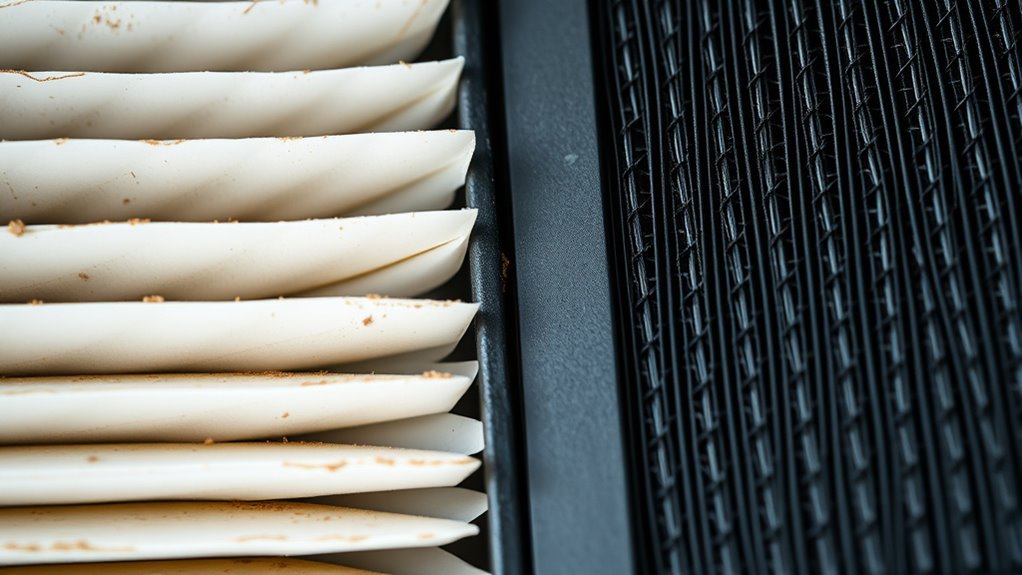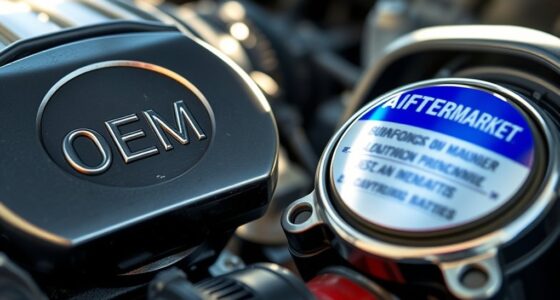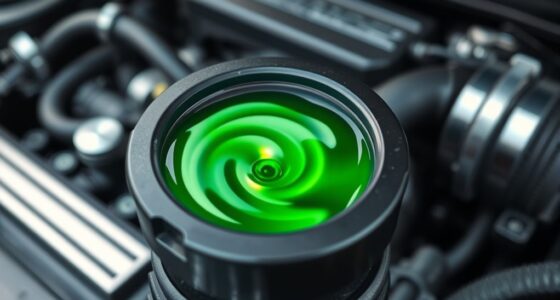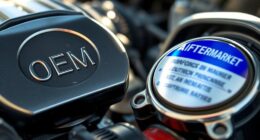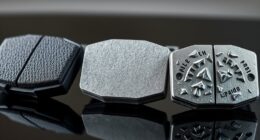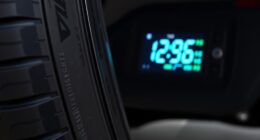The engine air filter protects your vehicle’s engine by blocking dirt, dust, and debris from entering the combustion chamber, helping the engine run smoothly and efficiently. The cabin filter, on the other hand, filters pollutants, pollen, and odors from the air inside your car, keeping the interior air clean and healthy. Both are essential for vehicle performance and passenger comfort. To discover the specific differences and maintenance tips, stay with us as we go into more detail.
Key Takeaways
- The engine air filter protects the engine by blocking dust and debris from entering the combustion chamber, while the cabin filter filters pollutants and allergens from the vehicle’s interior air.
- Engine air filters improve engine performance, fuel efficiency, and reduce emissions; cabin filters enhance passenger comfort by maintaining air quality inside the vehicle.
- Engine air filters are typically replaced every 15,000 to 30,000 miles, whereas cabin filters are replaced every 15,000 to 20,000 miles.
- A clogged engine filter can restrict airflow, reducing engine power; a dirty cabin filter can cause poor airflow and musty odors inside the vehicle.
- Both filters are easy to access and replace, but serve different roles in protecting engine components versus improving passenger air quality.
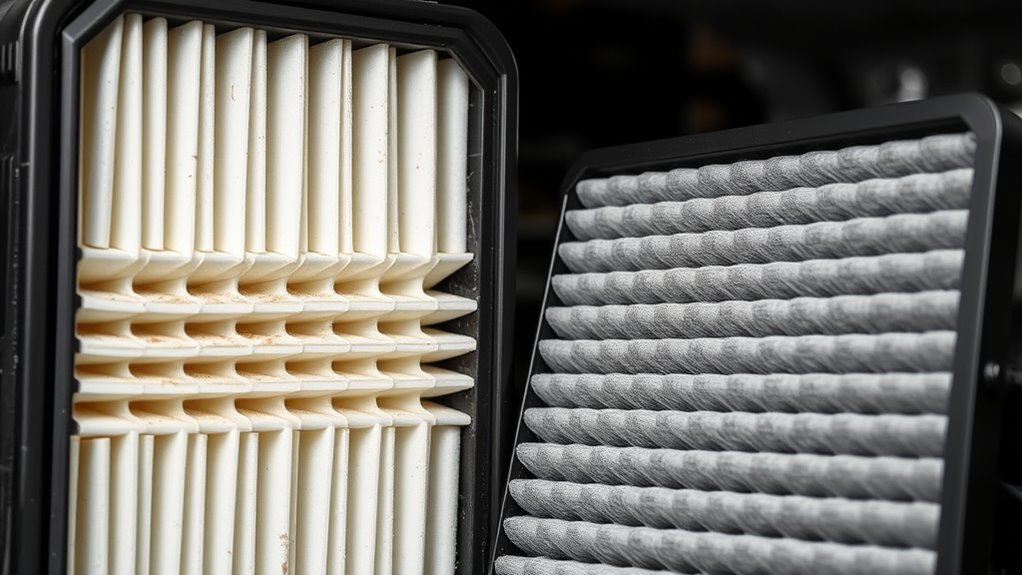
Understanding the difference between an engine air filter and a cabin filter is essential for maintaining your vehicle’s performance and comfort. These filters serve distinct purposes, but both are critical for protecting your car’s systems and ensuring a pleasant driving experience. The engine air filter’s primary role is to safeguard the engine by blocking dust, dirt, and other debris from entering the combustion chamber. When this filter functions properly, it helps maintain ideal airflow efficiency, allowing your engine to breathe clean air. This not only boosts performance but also improves fuel efficiency and reduces emissions. Conversely, the cabin filter works to keep the air inside your vehicle clean and free of pollutants, allergens, and odors. It’s especially important if you spend a lot of time driving through polluted environments or areas with high pollen levels. A clean cabin filter enhances air quality inside your car, making your rides more comfortable and healthier, especially for allergy sufferers.
Pollution protection is a key aspect of both filters but applies differently. The engine air filter’s pollution protection extends to preventing damaging particles from reaching delicate engine components, which could cause wear or corrosion over time. A clogged or dirty engine filter restricts airflow, forcing your engine to work harder and potentially reducing power. Regularly replacing or cleaning this filter ensures that airflow efficiency remains high, which in turn supports engine longevity and smooth operation. The cabin filter, on the other hand, provides pollution protection for you and your passengers. It traps airborne contaminants like dust, pollen, bacteria, and even exhaust fumes, helping you breathe cleaner air regardless of outside conditions. Maintaining a clean cabin filter ensures that the air circulating inside your vehicle remains fresh and free from irritants. Additionally, AI security technologies are increasingly being integrated into vehicle systems to detect and respond to cyber threats, ensuring safety beyond just physical components.
In terms of maintenance, the engine air filter generally needs replacement every 15,000 to 30,000 miles, depending on your driving conditions. If you often drive in dusty or polluted areas, you might need to change it more frequently. The cabin filter typically requires replacement every 15,000 to 20,000 miles, but it’s wise to check it more often if you notice reduced airflow from your vents or if you detect a musty smell inside your car. Both filters are easy to access and replace, making routine maintenance a straightforward task. By keeping these filters in good condition, you ensure your engine runs efficiently and your cabin remains a healthy, comfortable environment. Properly maintaining your filters not only improves performance and pollution protection but also prolongs the lifespan of your vehicle’s internal systems.
Frequently Asked Questions
How Often Should I Replace My Engine Air Filter?
You should replace your engine air filter based on your vehicle’s filter maintenance and recommended replacement schedule, typically every 12,000 to 15,000 miles. However, if you notice reduced performance, strange odors, or increased fuel consumption, it’s a sign to check and replace it sooner. Regular inspections help guarantee your engine breathes properly, maintaining efficiency and longevity. Always follow your car’s manual for the best guidance on replacement timing.
Can a Dirty Cabin Filter Affect My Car’S HVAC System?
Think of your car’s HVAC system like your lungs—if the filter’s dirty, your air quality drops. A clogged cabin filter restricts airflow, making the system work harder and reducing HVAC efficiency. I once struggled with foggy windows, only to find a dirty filter was blocking proper airflow. Keep it clean, and your system runs smoothly, maintaining good air quality and comfort while protecting your vehicle’s interior.
Are High-Performance Filters Worth the Extra Cost?
You might wonder if high-performance filters are worth the extra cost. They often provide better filtration, trapping smaller particles, which can improve your air quality and protect your vehicle’s system. While they may last longer and offer enhanced filtration, consider your driving environment. If you frequently drive in polluted areas, investing in a high-performance filter can be beneficial. Otherwise, standard filters usually do the job well for everyday use.
How Can I Tell if My Filters Need Changing?
You can tell if your filters need changing by paying attention to pollution levels and filter indicators. If you notice increased dust, bad odors, or reduced airflow, it’s likely time for a replacement. Many vehicles have filter indicators that alert you when it’s dirty. Regularly inspecting these signs helps you maintain ideal engine and cabin air quality, ensuring your car runs smoothly and stays comfortable.
Do Different Vehicle Models Require Different Filter Types?
Think of your vehicle as a bespoke suit—you need the right fit. Yes, different vehicle models require specific filter types because of unique engine and cabin needs. Always check your vehicle’s manual for compatibility and filter specifications. Using the wrong filter is like putting on shoes two sizes too small; it won’t fit properly and could cause issues. So, always prioritize vehicle compatibility to keep your ride running smoothly.
Conclusion
Think of your engine air filter and cabin filter as the lungs of your vehicle—one keeps your engine breathing easy, while the other guarantees your comfort inside the cabin. Both act as gatekeepers, blocking out unwanted debris and pollutants. Keep them in top shape, and your car will run smoothly like a well-oiled machine and feel as fresh as a spring breeze. Treat them well, and they’ll keep your journey clean and trouble-free.
